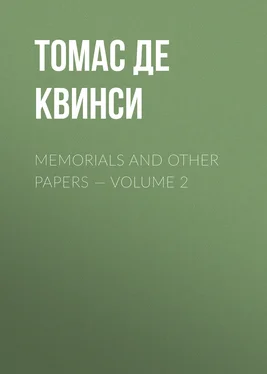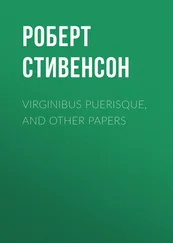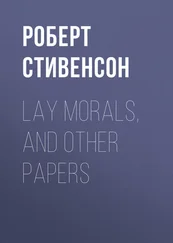Томас Де Квинси - Memorials and Other Papers — Volume 2
Здесь есть возможность читать онлайн «Томас Де Квинси - Memorials and Other Papers — Volume 2» — ознакомительный отрывок электронной книги совершенно бесплатно, а после прочтения отрывка купить полную версию. В некоторых случаях можно слушать аудио, скачать через торрент в формате fb2 и присутствует краткое содержание. Жанр: foreign_prose, literature_19, foreign_antique, на английском языке. Описание произведения, (предисловие) а так же отзывы посетителей доступны на портале библиотеки ЛибКат.
- Название:Memorials and Other Papers — Volume 2
- Автор:
- Жанр:
- Год:неизвестен
- ISBN:нет данных
- Рейтинг книги:4 / 5. Голосов: 1
-
Избранное:Добавить в избранное
- Отзывы:
-
Ваша оценка:
- 80
- 1
- 2
- 3
- 4
- 5
Memorials and Other Papers — Volume 2: краткое содержание, описание и аннотация
Предлагаем к чтению аннотацию, описание, краткое содержание или предисловие (зависит от того, что написал сам автор книги «Memorials and Other Papers — Volume 2»). Если вы не нашли необходимую информацию о книге — напишите в комментариях, мы постараемся отыскать её.
Memorials and Other Papers — Volume 2 — читать онлайн ознакомительный отрывок
Ниже представлен текст книги, разбитый по страницам. Система сохранения места последней прочитанной страницы, позволяет с удобством читать онлайн бесплатно книгу «Memorials and Other Papers — Volume 2», без необходимости каждый раз заново искать на чём Вы остановились. Поставьте закладку, и сможете в любой момент перейти на страницу, на которой закончили чтение.
Интервал:
Закладка:
Exactly at this point of time arose a dense mist, which wrapped the whole forest in darkness, and withdrew from the eyes of the agitated Klosterheimers friends and foes alike. They continued, however, to occupy the walls, endeavoring to penetrate the veil which now concealed the fortunes of their travelling friends, by mere energy and intensity of attention. The mist, meantime, did not disperse, but rather continued to deepen; the two parties, however, gradually drew so much nearer, that some judgment could be at length formed of their motions and position, merely by the ear. From the stationary character of the sounds, and the continued recurrence of charges and retreats sounded upon the trumpet, it became evident that the travellers and the enemy had at length met, and too probable that they were engaged in a sanguinary combat. Anxiety had now reached its utmost height; and some were obliged to leave the walls, or were carried away by their friends, under the effects of overwrought sensibility.
Ten o'clock had now struck, and for some time the sounds had been growing sensibly weaker; and at last it was manifest that the two parties had separated, and that one, at least, was moving off from the scene of action; and, as the sounds grew feebler and feebler, there could be no doubt that it was the enemy, who was drawing off into the distance from the field of battle.
The enemy! ay, but how? Under what circumstances? As victor? Perhaps even as the captor of their friends! Or, if not, and he were really retreating as a fugitive and beaten foe, with what hideous sacrifices on the part of their friends might not that result have been purchased?
Long and dreary was the interval before these questions could be answered. Full three hours had elapsed since the last sound of a trumpet had been heard; it was now one o'clock, and as yet no trace of the travellers had been discovered in any quarter. The most hopeful began to despond; and general lamentations prevailed throughout Klosterheim.
Suddenly, however, a dull sound arose within a quarter of a mile from the city gate, as of some feeble attempt to blow a blast upon a trumpet. In five minutes more a louder blast was sounded close to the gate. Questions were joyfully put, and as joyfully answered. The usual precautions were rapidly gone through; and the officer of the watch being speedily satisfied as to the safety of the measure, the gates were thrown open, and the unfortunate travellers, exhausted by fatigue, hardships, and suffering of every description, were at length admitted into the bosom of a friendly town.
The spectacle was hideous which the long cavalcade exhibited as it wound up the steep streets which led to the market-place. Wagons fractured and splintered in every direction, upon which were stretched numbers of gallant soldiers, with wounds hastily dressed, from which the blood had poured in streams upon their gay habiliments; horses, whose limbs had been mangled by the sabre; and coaches, or caleches, loaded with burthens of dead and dying; these were amongst the objects which occupied the van in the line of march, as the travellers defiled through Klosterheim. The vast variety of faces, dresses, implements of war, or ensigns of rank, thrown together in the confusion of night and retreat, illuminated at intervals by bright streams of light from torches or candles in the streets, or at the windows of the houses, composed a picture which resembled the chaos of a dream, rather than any ordinary spectacle of human life.
In the market-place the whole party were gradually assembled, and there it was intended that they should receive the billets for their several quarters. But such was the pressure of friends and relatives gathering from all directions, to salute and welcome the objects of their affectionate anxiety, or to inquire after their fate; so tumultuous was the conflict of grief and joy (and not seldom in the very same group), that for a long time no authority could control the violence of public feeling, or enforce the arrangements which had been adopted for the night. Nor was it even easy to learn, where the questions were put by so many voices at once, what had been the history of the night. It was at length, however, collected, that they had been met and attacked with great fury by Holkerstein, or a party acting under one of his lieutenants. Their own march had been so warily conducted after nightfall, that this attack did not find them unprepared. A barrier of coaches and wagons had been speedily formed in such an arrangement as to cripple the enemy's movements, and to neutralize great part of his superiority in the quality of his horses. The engagement, however, had been severe; and the enemy's attack, though many times baffled, had been as often renewed, until, at length, the young general Maximilian, seeing that the affair tended to no apparent termination, that the bloodshed was great, and that the horses were beginning to knock up under the fatigue of such severe service, had brought up the very elite of his reserve, placed himself at their head, and, making a dash expressly at their leader, had the good fortune to cut him down. The desperateness of the charge, added to the loss of their leader, had intimidated the enemy, who now began to draw off, as from an enterprise which was likely to cost them more blood than a final success could have rewarded. Unfortunately, however, Maximilian, disabled by a severe wound, and entangled by his horse amongst the enemy, had been carried off a prisoner. In the course of the battle all their torches had been extinguished; and this circumstance, as much as the roughness of the road, the ruinous condition of their carriages and appointments, and their own exhaustion, had occasioned their long delay in reaching Klosterheim, after the battle was at an end. Signals they had not ventured to make; for they were naturally afraid of drawing upon their track any fresh party of marauders, by so open a warning of their course as the sound of a trumpet.
These explanations were rapidly dispersed through Klosterheim; party after party drew off to their quarters; and at length the agitated city was once again restored to peace. The Lady Paulina had been amongst the first to retire. She was met by the lady abbess of a principal convent in Klosterheim, to whose care she had been recommended by the emperor. The Landgrave also had furnished her with a guard of honor; but all expressions of respect, or even of kindness, seemed thrown away upon her, so wholly was she absorbed in grief for the capture of Maximilian, and in gloomy anticipations of his impending fate.
CHAPTER VII
The city of Klosterheim was now abandoned to itself, and strictly shut up within its own walls. All roaming beyond those limits was now indeed forbidden even more effectually by the sword of the enemy than by the edicts of the Landgrave. War was manifestly gathering in its neighborhood. Little towns and castles within a range of seventy miles, on almost every side, were now daily occupied by imperial or Swedish troops. Not a week passed without some news of fresh military accessions, or of skirmishes between parties of hostile foragers. Through the whole adjacent country, spite of the severe weather, bodies of armed men were weaving to and fro, fast as a weaver's shuttle. The forest rang with alarums, and sometimes, under gleams of sunshine, the leafless woods seemed on fire with the restless splendor of spear and sword, morion and breast-plate, or the glittering equipments of the imperial cavalry. Couriers, or Bohemian gypsies, which latter were a class of people at this time employed by all sides as spies or messengers, continually stole in with secret despatches to the Landgrave, or (under the color of bringing public news, and the reports of military movements) to execute some private mission for rich employers in town; sometimes making even this clandestine business but a cover to other purposes, too nearly connected with treason, or reputed treason, to admit of any but oral communication.
Читать дальшеИнтервал:
Закладка:
Похожие книги на «Memorials and Other Papers — Volume 2»
Представляем Вашему вниманию похожие книги на «Memorials and Other Papers — Volume 2» списком для выбора. Мы отобрали схожую по названию и смыслу литературу в надежде предоставить читателям больше вариантов отыскать новые, интересные, ещё непрочитанные произведения.
Обсуждение, отзывы о книге «Memorials and Other Papers — Volume 2» и просто собственные мнения читателей. Оставьте ваши комментарии, напишите, что Вы думаете о произведении, его смысле или главных героях. Укажите что конкретно понравилось, а что нет, и почему Вы так считаете.












